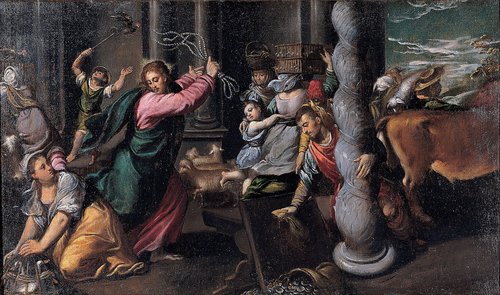Ministers and Money Makers

One of the most terrifying things about public ministry is the realization that some of the hardest and most uncomfortable sayings in the bible are aimed directly at you. The gospel is good news for the poor and the oppressed, the outcast and the downtrodden, but it can also be a swift kick in the backside for religious leaders.
Woe to the scribes and pharisees, the teachers and preachers of scripture, Jesus says over and again in Matthew 23. They are hypocrites, blind guides, whitewashed tombs – holy and shiny on the outside but rotten within. Jesus likewise rebukes those who make a public show of their prayers (Mt 6:5), who walk around in special religious garments (Mt 23:5) and enjoy a place of status and honor. It is little wonder that James writes that not many should become teachers, ‘for you know that we who teach will be judged with greater strictness’ (James 3:1).
The story of Jesus’ confrontation with the moneychangers in John 2 (cf. Mt. 21; Mk. 12; Lk. 20) reminds us that an encounter with Jesus Christ is not always a comfortable experience. Sometimes Jesus arrives, not with a word of peace, but with a whip of cords. And more often than not, the whip is aimed directly at those in the ‘business’ of religion.
The scene takes place in the temple, the beating heart of religious, cultural, and national life for the people of Israel. Jews travelled to the Temple from throughout Judea and well beyond to offer prayers and worship, to meet up with distant friends and family, to present themselves and their children to God, and to offer sacrifices. To save people from having to travel from far away with a lamb or a couple of birds in their rucksack, there developed a convenient system in which one could purchase one’s animals right there at the temple. And this is exactly what we see in John 2: people selling cattle, sheep, and doves and exchanging currency within the gates of temple.
Why does this provoke such a response from Jesus? Because, according to Jesus, the moneychangers had turned his Father’s house into a marketplace (Jn. 2:16)! Jesus was outraged, in other words, by the commodification of the sacred, the twisting of Israel’s religion for personal gain. As Thomas Aquinas writes in his commentary on this passage, the reason Jesus drove them out of the temple that day was because ‘the priests did not intend God’s glory, but their own profit.’ The religious leaders had found a way to capitalize off of the spiritual needs of the people. It wasn’t just cattle and pigeons that they were selling, it was access to God. God was the product; and in Israel in the first century, God was good business.
The motivation for personal profit in ministry comes in many shapes and sizes. For some, the profit is ‘power’—the spiritual power of the church’s sacramental ministry, the power of leadership, or the power of authoritative teaching. For others, the profit is affirmation and admiration—the desire to be seen as holy, wise, or (ironically) selfless. For some, it is simply the desire for self-fulfillment—a sense that ministry will provide meaning and purpose to one’s life.
According to Augustine, all who seek their own personal gain in ministry should beware of the whip of cords, for the grace of God is not something to be sold, it is a gift that is freely given.
This is a word of stern warning to all in public ministry, but it is also a word of great comfort and encouragement. Because at the end of the day, it is not our job to sell anything. Grace is a gift freely given, and the more we ourselves draw from the source of God’s love, the more eagerly and freely we come to share that love with others.
This means that we don’t have to do whatever it takes to find personal fulfilment in ministry, because God is already our fulfillment. We don’t have to find our worth in the praise, respect, or adoration of others, because our worth is grounded and secure in the love of God. The true ‘profit’ of ministry is the privilege of participating in Christ’s ongoing work in the world. It is the joy of serving in his name and of experiencing, in our own lives and in the lives of those we serve, the transformative power of his presence.
By Jordan Hillebert